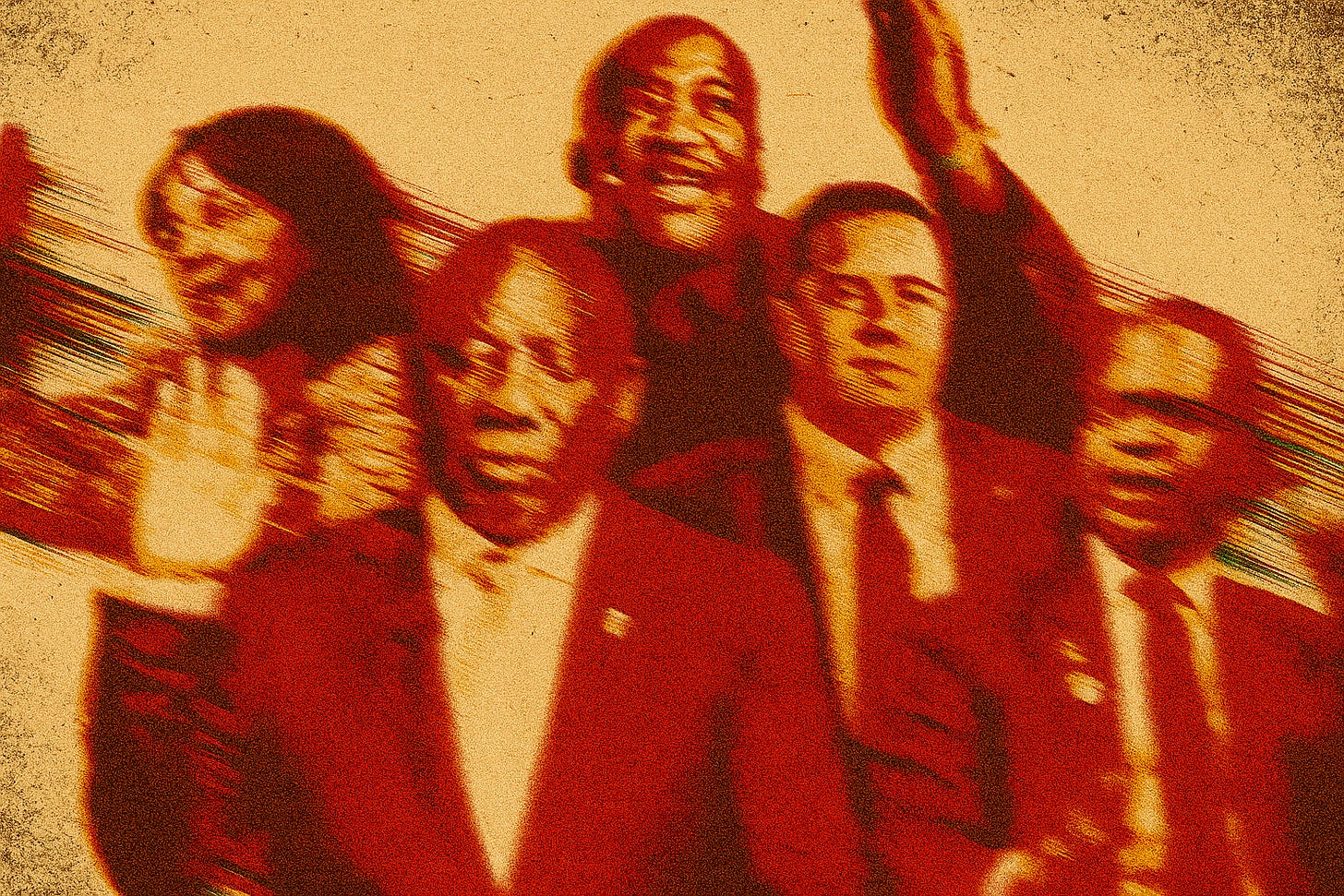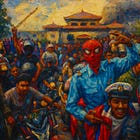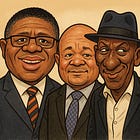The Real Divide in South African Politics Is Between Builders and Breakers
How a politics of competence is replacing the politics of conviction.
Political analysis is often simplified and made digestible through grand ideological divides. Neat pairs that bring order to the chaos of ideas and the exercise of power. Left versus right, state versus individual, progressive versus conservative, centralisation versus federalism. These categories have their place. They help us understand political schools of thought, organise policy choices, and even test our own values. But in a country like South Africa that is grappling as much with its post-apartheid history as with two decades of deep state decay, these ideological binaries are not always useful.
These old dividing lines do not necessarily precisely explain the moment the country and its communities now find themselves in.
The Horseshoe Theory and the Politics of Grievance
According to the so-called political horseshoe theory, the far left and far right are closer to each other than they realise. This is particularly evident in the United States. Donald Trump was elected on a free-market mandate but went on to implement a series of anti-market policies like tariffs, and even forms of state involvement in private business that could just as easily have come from the preceding Biden, Obama, or a hypothetical Bernie Sanders administration.
Both extremes believe their group is under siege by a corrupt elite or hostile system, and both want to use the state to impose their version of justice at all costs. It’s grievance politics where each side nurtures its own sense of victimhood. The woke left sees itself as victims of patriarchy, capitalism, and colonial legacies, while the new right sees itself as victims of globalism, progressive media, and cultural decay.
Both draw power from the feeling of injustice rather than from a desire for order, balance, and creation. These extremes cannot build, because their politics of resentment depends on a perpetual sense of crisis. Without an ever-present threat, they lose their reason for being. They cannot restore institutions, because their power is derived precisely from public distrust in those institutions.
And so around the world, a new axis of politics is emerging between those who preserve institutions and those who burn them for applause. This divide has long existed in South Africa between a decaying state and private entities (businesses and communities), but the country’s upcoming election will test whether formal politics will finally catch up and acknowledge this split.
In a country where our literal and figurative structures are crumbling, we need less ideological debate and more builders.
The South African Test: Building vs Breaking
Despite the immense influence of political and cultural debates spilling over from the US and Europe, it remains striking how disproportionately our own commentariat discusses these foreign issues in a South African context. Debates about whether we’re witnessing the end of America’s global dominance, Europe’s migration crisis, or who’s cancelling their Netflix subscriptions fill columns and panel discussions even here on our sunny South African shores.
But for the average South African, the person living daily with loadshedding, potholes, and erratic water pressure, these global ideological battlefields are a luxury concern.
Our context is that of a post-apartheid nation that has lived through two decades of state decay, corruption, and infrastructure collapse. In such a country, ideological labels like left and right mean little. What matters is simpler: who builds, and who breaks.
The tension between building and breaking is not new. Plato wrote about philosopher-kings who build a just order versus the sophists and demagogues who feed on decay and ignorance. Aristotle distinguished between those who create and strengthen the polis and the parasites who drain it. Millennia later, Thomas Sowell wrote of those who create economic value versus those who merely consume it. Ayn Rand’s Atlas Shrugged was entirely about the conflict between builders and looters.
Politics in South Africa today can likewise be reduced to two types of actors: the builders, those who restore institutions, fight corruption, improve administration, and bring order. And the breakers, those who steal, destroy, make excuses, and plunder what remains of the state.
The Era of Doers
The next decade will belong to the doers. Not the talkers, theorists, or commentariat, but the people and parties who show that they can build, manage, and repair.
South Africans will increasingly reward those who can, at a local level, fix roads, restore water systems, make schools function, and improve safety. Because people do not live on ideology. They do not live on policy documents or conferences. For ordinary citizens, politics is not a philosophical debate but survival, a daily struggle to live safely and prosperously.
And that doesn’t only apply to the poor. It applies equally to the middle class who wake up without water, lose tyres to potholes, and pay taxes, medical aid, and private security.
Some analysts like to point out that if you add up the support for the ANC, EFF, MK, and a few smaller ideological allies, the so-called transformation ideology still commands a majority. But that is a shallow and, in my view, short-sighted reading of the political landscape. Those votes are shifting among parties of the same ideological origin but the underlying disease of those parties remains: lots of talk, little action. In every era of institutional collapse, grievance becomes the cheapest political currency. As Eric Hoffer observed, movements built on resentment can only sustain themselves through perpetual crisis because order and civility would expose their emptiness.
These parties differ in rhetoric but not in results. And as people’s lives continue to deteriorate while the noise grows louder, voters will increasingly turn their backs on this entire generation of political talkers.
This divide between doing and talking is not confined to formal politics. It’s visible across civil society too. The growing premium South Africans place on action over opinion is evident in the success of civic organisations that actually do things. Organisations like AfriForum, with over 300 000 members and hundreds of local branches, or Gift of the Givers, show that people are drawn to visible results. They fill potholes, repair water pumps, deliver emergency aid, and take the state to court when it fails to act.
These organisations thrive not because they publish policy papers, but because they make a tangible local difference, despite how diverse people’s views about their politics may be.
Conclusion
Abraham Maslow’s hierarchy of needs teaches that humans must master survival and safety before they can pursue self-actualisation. South Africa, with its power cuts, water shortages, crime, and corruption, is simply too far removed from those higher levels of political contemplation to be debating the fine distinctions between liberalism and conservatism. And I say this as someone who deeply values and writes about those debates. But no system of ideas can help you if your sewerage system doesn’t work.
One year before the next local government elections, South Africans should therefore not be asking: Am I left or right? or Which leader fits my ideology? The question is simpler: Who builds, and who breaks?
Which party has a record of repair, of financial discipline, of working infrastructure, and of transparency? And which parties have a record of decay, self-enrichment, and destructive utopian promises from the outset?
Even the harshest critics will have to admit that in this country, there are parties that build. The temptation will be to say: yes, but I’d rather vote for a party that builds and perfectly reflects my ideological shade. But that is wishful thinking. That ideal party won’t be on next year’s ballot. Like Sacha Feinberg-Mngomezulu on a rugby field we must play what’s in front of us.
In the next twelve months as we build up to the local government elections, much will be written about the election about parties, leaders, their tweets, and their scandals. The media storms will come, full of noise and moral panic. But amid all that, we should keep asking one simple question:
Am I voting for builders or for breakers?
More articles:
If you found this piece worthwhile, feel free to share it with someone who might appreciate it.
To get future essays delivered directly to your inbox, you can subscribe here:
I welcome thoughtful conversation—feel free to reach out on LinkedIn or follow along on Twitter.
If you'd like to support my writing please subscribe and consider a pledge.
This cover image was created using Sora.






